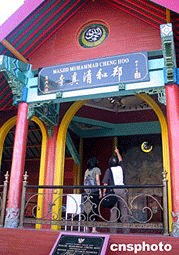The Chinese-Indonesians have got chances to promote their ethnic harmony with
the indigenous people in Indonesia's provinces like Central Java, Yogyat, Bali
and East Java, as China's Ming Dynasty navigator Zheng He left them a lot of
legacy to share.
The legacy left by China's ancient seafaring hero Zheng He (1371-1435) during
his seven ocean voyages hundreds of years ago included handicrafts, tourism
locations, religious customs and commercial ideas,
Semarang, the capital city of Central Java Province, is renowned for the Sam
Poo Kong Temple, where Zheng He once meditated during his fleet's stay. At
present, the temple draw some 100 pilgrims each day, which include not only
Chinese-Indonesians, but also indigenous people.
"They come to ask Zheng He to protect them," said Li Botu, chairman of the
Commemoration Organization for the 600th Anniversary of Zheng He's Ocean
Navigation, adding that the temple has helped both sides know more about each
other and promoted their ties.
According to Li, the local government and businessmen have raised 4 billion
rupiahs (about 500,000 US dollars) to commemorate the 600th anniversary of Zheng
He's first navigation in 1405.
The money will go for seminars on Zheng He's contribution, a photo exhibition
of his navigation, the establishment of a new Zheng He Temple as well as ritual
performances by various artists.
Governor of Central Java Province Mardianto has promised to attend the
activities, while officials from China's Fujian Province, which is Semarang's
sister province, are also considering coming to the city, which has 2.5 million
resident, 15percent of them Chinese-Indonesians, said Li.
In Yogyat, what the Chinese-Indonesians and the indigenous people share is
not temple, but wells. As legend has it, Zheng He and his fleet's members taught
local people to dig wells for water.Years later, the wells were deified. People
thought that the water from such wells could heal, drive away evils and ensure
safety.
Nowadays, when festivals come, Yogyat residents would draw water from wells
to have shower, clean babies and wash clothes.
"Zheng He left a healthy life style for local people. The Chinese-indonesians
here are well-treated more or less due to Zheng He's legacy," said Bimo Yuwono,
secretary of the Indonesian Chinese Association in Yogyat.
In Bali, the largest tourism province of Indonesia, both indigenous people
and Chinese-Indonesians worship a Chinese businessman as "God of Wealth," who
once followed Zheng He during his navigation but finally stayed here to become
the treasury minister and commenced commerce for the locality.
The businessman, later named as Igusti Ngurah Subandar, also brought here
bronze coins, porcelain, wood and stone sculptures. Local people mastered such
handicrafts soon and finally turned Bali into "an island of folk art." Now,
shops making and selling wood and stone sculptures have become one of the
landmarks for theisland.
"His pioneering work has benefited generations of Balinese as the province
gradually develops into one of the hottest sightseeing destinations in
Southeastern Asia," travel guide Zheng Bihong told Xinhua reporters while citing
folklores.
Now, the treasury minister's temple on the Kintamani Mountain attracts dozens
of indigenous and Chinese-Indonesian pilgrims eachday, which bears out the
affection among the two ethnics.

Zheng He Mosque in Surabaya
In Surabaya, the capital city of East Java Province, the mosque named after
Zheng He has contributed a lot to local people's religious and cultural life
since it was established two years ago.
Then Chinese Ambassador to Indonesia Lu Shuming contributed an inscribed
board to the mosque at its opening ceremony on May 28, 2003, which read "Masjid
Muhammad Zheng Hoo."
In the mosque, there are more than three religious ceremonies held each month
and the largest one within a year can attract 15,000 Muslims, Abbas Hary from
the Indonesian Zheng He Fund told Xinhua reporters.
Except for pilgrims, the mosque also greets some 20 to 30 indigenous and
Chinese-Indonesian travelers per day, who come here to feel Zheng He's bravery,
open-mindedness and friendly spirit.
"When both indigenous Muslims and Chinese-Indonesian Muslims attend the same
ceremony or visit the same mosque, you can see peace and harmony," said Hary.



